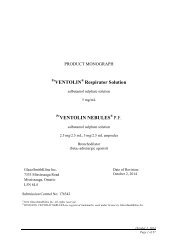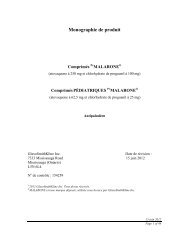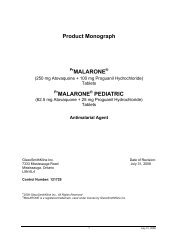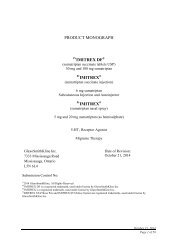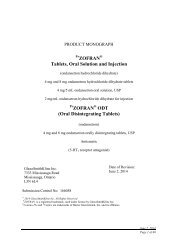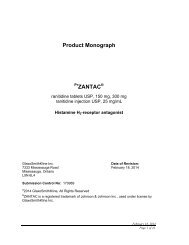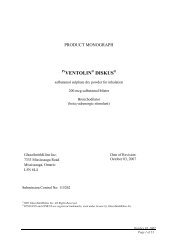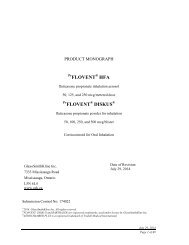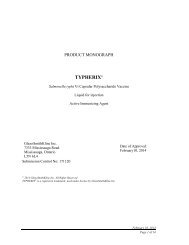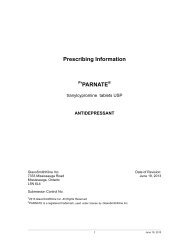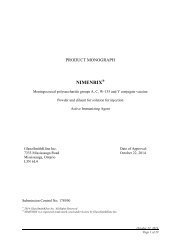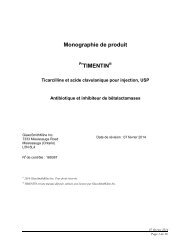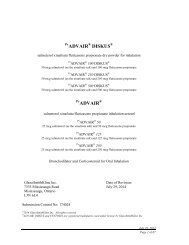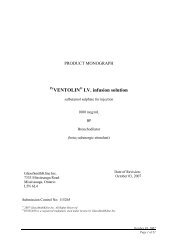View as PDF - GlaxoSmithKline
View as PDF - GlaxoSmithKline
View as PDF - GlaxoSmithKline
- No tags were found...
You also want an ePaper? Increase the reach of your titles
YUMPU automatically turns print PDFs into web optimized ePapers that Google loves.
Specifically, the Carbon Trust <strong>as</strong>sessed and certified GSK’s carbon footprint over a threeyear period across 65 countries, 200 sites and eight business divisions.Key elements of GSK’s new environment strategy include:A commitment to a long-term goal for company operations and the value chain tobe carbon neutral by 2050. This target means there will be no net greenhouseg<strong>as</strong> emissions from manufacturing, distribution, use and disposal of products andthe sourcing of raw materials.Interim targets to reduce GSK’s overall carbon footprint by 10% by 2015 and25% by 2020.Target set to reduce GSK’s operational water consumption by 20% by 2015 andto reduce w<strong>as</strong>te to landfill from operations by 25% by 2015 and to zero by 2020.Delivering sustainable operations with financial benefits – the company estimatesit can save £100m per annum by 2020 through reduced energy, materials anddistribution costs.Access to medicinesGSK acknowledges that much still needs to be done by all stakeholders includingbusiness, Governments and NGOs, to tackle the issue of access to medicines indeveloping countries. Nevertheless the company continues to take substantive steps toreform its business practices, including adopting a range of flexible pricing models, toexpand availability of its medicines and vaccines to <strong>as</strong> many of the people who needthem <strong>as</strong> possible.In July 2010, GSK also created a specific Developing Countries and Market Access(DCMA) business unit dedicated to incre<strong>as</strong>ing patient access to GSK medicines whileexpanding the company’s presence and helping it to build a sustainable business indeveloping countries. The unit’s success will be judged not only on profits, but also onits contribution to incre<strong>as</strong>ing access to medicines.Following GSK’s commitment to reduce prices of its patented medicines in LDCs to nomore than 25% of their price in the UK (or in France for products not sold in the UK),sales volumes for the majority of products have incre<strong>as</strong>ed significantly. For example, inE<strong>as</strong>t Africa the prices for GSK patented brands (Avamys, Avandamet, Avodart, Flixotide,Malarone and Seretide) were reduced by an average of 69% and the number of packssold incre<strong>as</strong>ed more than fourfold (320%) by the end of 2010.GSK also repeated its pledge to price its malaria candidate vaccine (RTS,S) responsiblyand at a level which is affordable for African countries. The vaccine is currently in latestageclinical development, and if approved, will be the first vaccine against malaria, withthe potential to save the lives of millions of children across Africa. GSK h<strong>as</strong> committedto price the vaccine at a level that covers costs and generates a small return of aroundfive per cent which it will reinvest in the development of future vaccines for malaria orother products for dise<strong>as</strong>es of the developing world.Although progress is being made, only one third of the 15 million people living with HIVin sub-Saharan Africa who need therapy are receiving it. To contribute to efforts toimprove availability of medicines, ViiV Healthcare, a global specialist HIV companyestablished by GSK and Pfizer, extended its policy on voluntary licences in 2010.Voluntary licences are granted by patent holders to allow generics companies to2



